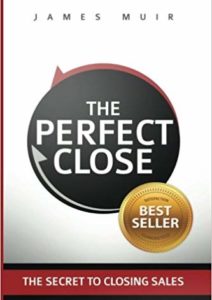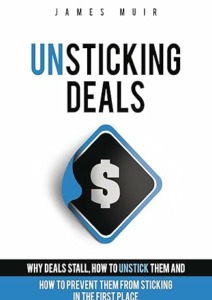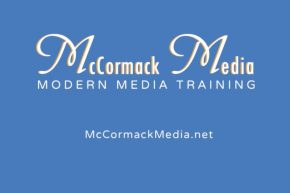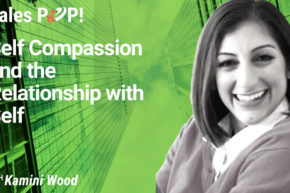Wouldn’t you love to know the secrets to a perfect close? It sounds too good to be true, right? James Muir, interviewed by John Golden, reveals the secrets to an excellent close that is nonconfrontational, no pressure, and moves at the speed of the buyer to increase your final close rate.
This expert sales interview explains the perfect close, including:
- Why advancement is important
- How to work with a client, not against a client
- The importance of timing
- Two fundamental questions to achieve the perfect close
The Importance of Advancement:
60-90% of all sales encounters end with no close, or no advance happening at all. The thing causing this scary number is that many salespeople have been taught somewhat manipulative closing techniques that they aren’t comfortable using. As a result, they don’t do anything. “What makes the perfect close perfect is that it’s just two questions, it’s nonconfrontational, and every time we use it we’re either going to get an advance, or we’ll get a close,” said Muir.
Work With the Client:
When you work with a client, they are trying to make something happen. They’re trying to achieve a goal. And who wouldn’t want a coach that could move them closer to their goal? The buyer wouldn’t be engaging with a salesperson if they were able to reach their goal and solve their problem on their own. “They’re engaging with us precisely because they’re looking for someone to help them move forward, and they’re going to welcome a salesperson’s involvement in that opportunity,” said Muir. So why do things go wrong? “When we start pushing faster than the customer is ready, it starts feeling like pressure to them, and that’s when it starts to backfire,” said Muir. The goal is to create a dynamic that is nonconfrontational, with no pressure, but is still directive and continues to advance the sale forward.
The Importance of Timing:
So, how can a salesperson get in sync with the right pace for the customer to move forward? “If you ask the right way, you can go into the scenario almost clueless, and you can still move at the pace that the customer is ready for,” said Muir. Ideally, we would know where the customer is at in their buying journey, and we can understand what a logical next step is for them to continue their march forward. If you don’t know, asking questions and creating a connection with the buyer will assist in your understanding of where they are at in the sales cycle and their readiness to buy or not.
Question 1:
There are two fundamental questions to complete the perfect close. There are slight variations on each of the questions, but the most basic version is straightforward. A salesperson likely has an idea of what their best case scenario is, and what they want from the buyer. When the salesperson frames it as a question, for example: “Does it make sense to schedule an assessment,” you are gently suggesting a logical next step, as well as asking the customer their opinion. “Does it make sense to X,” where X is your idea advance, is question number one. It’s often very successful, especially because by making the suggestion, you’re adding value to the scenario. Customers who aren’t familiar with the buying process may not know what step to take next and are grateful for the recommendation.
Question 2:
If you get a yes as a response to the first question, then you have earned your ideal advance. If they say no, you utilize the second question, which is, “what do you think is a good next step?” You throw the buyer back the ball. Most of the time, they will suggest a logical next step that they feel comfortable with at that point in the buying process and will move everything forward.
For more information on how to achieve the perfect close, including more detailed variations of the two questions, watch the entire expert sales interview!
About our Host:
John is the Amazon bestselling author of Winning the Battle for Sales: Lessons on Closing Every Deal from the World’s Greatest Military Victories and Social Upheaval: How to Win at Social Selling. A globally acknowledged Sales & Marketing thought leader, speaker, and strategist. He is CSMO at Pipeliner CRM. In his spare time, John is an avid Martial Artist.
Pipeliner CRM empowers salespeople to go for the perfect close, every time. Get your free trial of Pipeliner CRM now.










Comments